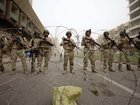A series of attacks in Egypt's restive Sinai peninsula over the past 24 hours, mostly against soldiers, killed at least four people, security officials said on Tuesday.
The violence comes as the Egyptian military presses its campaign in Sinai to quell an insurgency that surged after the army overthrew Islamist president Mohammed Morsi on July 3.
 Full Story
Full Story
Syria's main opposition group denounced on Tuesday as a "political maneuver" a Russian plan on Syria's chemical weapons, saying it is part of a useless procrastination.
"The proposal of Lavrov is a political maneuver and is part of useless procrastination that will only result in more deaths and destruction for the Syrian people," said an opposition statement.
 Full Story
Full Story
Senior Israeli politicians have voiced skepticism about Russia's proposal for Syria to surrender its chemical weapons to international control.
Avigdor Lieberman, who chairs the parliament's foreign affairs and defense committee, told Israel Radio on Tuesday that Syria could use the proposal to "buy time."
 Full Story
Full Story
Attacks in central Iraq killed 16 people on Tuesday, including six shot dead when gunmen stormed a house where a corpse was being ritually washed ahead of a funeral.
The violence, in restive Diyala province and an area known as the "Triangle of Death", is the latest in a surge in unrest that has left more than 4,000 people dead so far this year.
 Full Story
Full Story
Iran "favorably welcomes" a Russian plan to head off threatened U.S. strikes on Syria by securing a deal to destroy the regime's chemical weapons, the foreign ministry spokeswoman said Tuesday.
Marzieh Afgham told a media conference in Tehran that the proposal should include the destruction of chemical weapons in the hands of rebel groups fighting to topple the regime of Syrian President Bashar Assad.
 Full Story
Full Story
Syrian government forces were most likely to blame for the deadly chemical weapons attack last month which left hundreds dead, Human Rights Watch said Tuesday.
A 22-page report issued by the U.S. rights watchdog concluded that available evidence "strongly suggests" that President Bashar Assad's military carried out the strike.
 Full Story
Full Story
U.S. Senate Majority Leader Harry Reid said Monday he is delaying a key vote on authorizing the use of force in Syria to let President Barack Obama publicly address the issue.
Earlier in the day, the top Obama ally in Congress had scheduled the crucial test vote for Wednesday but then backtracked to let the U.S. leader sell his plan on strikes against the regime of Syrian President Bashar Assad.
 Full Story
Full Story
President Barack Obama conceded Monday night he might lose his fight for congressional support of a military strike against Syria, and declined to say what he would do if lawmakers reject his call to back retaliation for a chemical weapons attack last month.
The president sought to use a glimmer of a possible diplomatic solution — including vaguely encouraging statements by Russian and Syrian officials on Monday — as fresh reason for Congress to back his plan. Syria welcomed a proposal to turn over all of its chemical weapons to international control.
 Full Story
Full Story
At home and abroad, America's disastrous war in Iraq hangs over the debate on Syria, feeding skepticism that U.S. military action can deliver as promised.
"It's the elephant in the room," said Larry Korb, a former Pentagon official and a senior fellow at the Center for American Progress.
 Full Story
Full Story
Hillary Clinton emerged from a meeting with U.S. President Barack Obama Monday saying a Russian plan for Syria to hand over its chemical arms would be an "important step."
The former secretary of state also warned that Russia must sincerely help international efforts to defuse the crisis or "be held to account" and that the new initiative must not be an excuse for delay or obstruction by Syria.
 Full Story
Full Story



